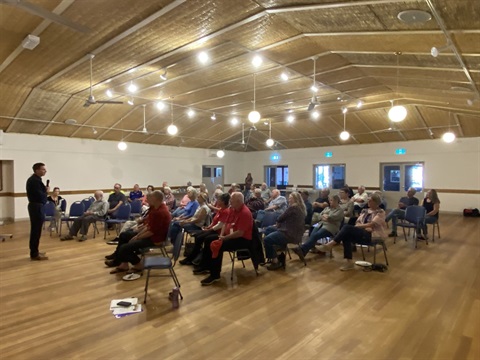Important tips for managing the effects of disaster
Published on 05 March 2024

Council's Flood Recovery and Resilience team recently hosted community conversations in Newstead and Campbells Creek, presented by David Younger, disaster preparedness and recovery expert.
Around 40 people were in attendance at Newstead and 13 at Campbells Creek to hear David talk on the common impacts people may experience following a natural disaster or other emergency and some of the tools that can assist induvial and community recovery and resilience.
David’s presentations were followed by Q&A sessions, providing an opportunity for community members to ask questions, or raise issues or concerns around floods and other natural disasters.
A suggestion box was also provided, and our team has begun the process of compiling and reviewing for follow-up, including the feedback from both the Q&A and suggestion box.
Our resilience team also updated audiences on the next stage of Council’s flood recovery and reliance program, involving recruitment of a consultant in March to start working with flood impacted communities across the shire.
Communities, agencies and stakeholder groups will be invited to come together to look at ways we can coordinate efforts to be better prepared for, and respond to, future floods and other natural disasters.
As David pointed out, “communities that are well prepared for floods and other natural disasters are more resilient to the impacts of such events, meaning they are well placed to recover better, both as individuals and collectively”.
David Younger's tips for managing the effects of disaster
- Manage the disruption and don’t let it take over and rule life.
- Be clear with life priorities, and ensure that time and space is made for maintaining relationships as well as involvement in enjoyable and nourishing activities.
- Manage stress levels and in regard to endurance, plan a speed for recovery that is sustainable. Remember, it is important to not use all of your energy in the first year.
- Acknowledge the extent of your own loss and make space and time to grieve. Also, don’t make assumptions about the extent of the losses of others. It is usually hard to know exactly what another person’s experience is.
- Make the choice to look after your mental health and wellbeing. Our health is our wealth, and without it recovery and reaching a point of being recovered will be difficult.
- Remember that recovery is very much a unique journey that differs from person to person, couple to couple, and family to family. Ultimately being flexible, optimistic, remaining connected, and being involved in your community can all help.